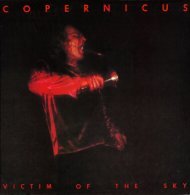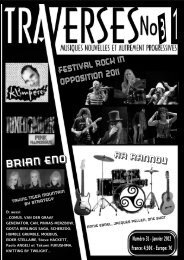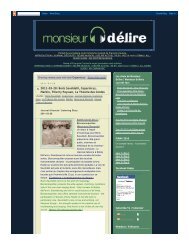Victim Of The Sky - Copernicus
Victim Of The Sky - Copernicus
Victim Of The Sky - Copernicus
You also want an ePaper? Increase the reach of your titles
YUMPU automatically turns print PDFs into web optimized ePapers that Google loves.
COPERNICUS<br />
<strong>Victim</strong> <strong>Of</strong> <strong>The</strong> <strong>Sky</strong><br />
Perhaps the most fitting way to describe <strong>Copernicus</strong> is as a performance poet. Even though he<br />
(originally named Joseph Smalkowskj) plays keyboards, <strong>Copernicus</strong> refuses to be categorized as<br />
a musician. Despite often having inhabited the alternative New York rock'n'roll scene, his music<br />
also exudes strong elements of jazz, classical and the avant garde. Even though <strong>Copernicus</strong>'<br />
preferred recording strategy is that of improvisation, his epic pieces tend to revolve around<br />
themes, riffs and repeated clusters, moving along a clearly linear pathway.<br />
<strong>The</strong> booming delivery and abstract texts evoke the spirit of classic beat generation poetry, but<br />
the <strong>Copernicus</strong> stance goes back even further to the theatrical confrontations of the Dada<br />
movement. He's always preferred the improvisatory approach, even though each poem's grist<br />
might be prepared in advance, their rhythms and content might be disassembled in the moment.<br />
<strong>Copernicus</strong> has always been fiercely independent, since he first started recording in this<br />
manner, back at the dawn of the 1980s. He organizes the recording sessions, sculpts the<br />
assembled band, oversees the album artwork and releases each disc on his own Nevermore, Inc.<br />
label. 1985 brought Nothing Exists, which emphatically laid out the themes of his subsequent<br />
work. A burst of creativity led to the swift succession of <strong>Victim</strong> <strong>Of</strong> <strong>The</strong> <strong>Sky</strong> (1987), Deeper<br />
(1989) and Null (1990). <strong>Of</strong>ten, <strong>Copernicus</strong> would perform with large-scale ensembles, but in<br />
1991 he initiated the practice of giving completely solo performances, revealing his declamations<br />
in a stripped, confrontational space. He views himself as a conduit for abstract ideas and<br />
philosophical notions. <strong>Copernicus</strong> decided that his particular marriage of music and narrative<br />
was the best way to communicate his thoughts and concepts to a receptive audience.<br />
With this second album release, <strong>Victim</strong> <strong>Of</strong> <strong>The</strong> <strong>Sky</strong>, <strong>Copernicus</strong> maintained an uncompromising<br />
approach of improvised connection between words and music. <strong>Copernicus</strong> considers his albums<br />
to be documenting the evolution of a mind struggling to understand what he calls Absolute<br />
Truth. <strong>The</strong> intention is that the listener will arrive at each recording in chronological sequence.<br />
<strong>Copernicus</strong> reveals that the opening "Lies!" hurls doubt "about believing in any of the modern<br />
prevailing philosophical concepts, including patriotism, time, generation, race, species, planet.<br />
He has nothing and he is free of all of these lies. Nothingness becomes a liberation of the<br />
weight of carrying around prevalent illusions".<br />
"<strong>The</strong> Wanderer" enters stage-left as a perverse form of country music, delivered with a deep<br />
vibrato that's as close to conventional singing as <strong>Copernicus</strong> gets. A toxic, experimental<br />
reflection of Johnny Cash. <strong>The</strong>se sessions find the poet sounding less removed from the daily<br />
grinding concerns of conventional reality, more earthy in his direct expression, bristling with<br />
an edge of anger and implied bitterness. Not necessarily from within, as it's clear that<br />
<strong>Copernicus</strong> is frequently submersing himself in a variety of characters, not only inhabiting his<br />
own grand-scale perspective of events. <strong>The</strong>re's sometimes a sharply critical negativity to his<br />
bearing, a biting view of states that range from cosmic and broad right down to domestic and<br />
particular.<br />
"<strong>Victim</strong> <strong>Of</strong> <strong>The</strong> Night" marries mechanoid svnth-drums to acoustic guitar figures, alto saxophone<br />
tendrils with sickly disco beats, <strong>Copernicus</strong> hissing serpent-like over this sparse garage<br />
punk backdrop. <strong>The</strong> song breaks down, leaving <strong>Copernicus</strong> alone, his sibilant words scrabbling<br />
around like rats under the floorboards. He's tackling subjects that lie further out on the edge.<br />
"We get the feeling that he believes that human beings are victims of a cruel universe," says<br />
<strong>Copernicus</strong>. "A macrocosm and a microcosm that. indifferent to humanity, perpetrate their<br />
crimes on humanity by never explaining the game to poor ignorant human beings" ..<br />
"Not Him Again!" opens with a short burst of electro-stuttering, jolting sped-up elements<br />
where cackling madness briefly reigns, against distant piano abstractions. "<strong>Copernicus</strong> attacks<br />
patriotism, existence, and reveals how he is living inside of his brain because everything<br />
around him is insupportable illusion".<br />
<strong>The</strong> style jumps.to reggae for "Desperate", a song from band member Larry Kirwan, but the<br />
true climax arrives, rather fittingly, with the extended closer "<strong>The</strong> Lament <strong>Of</strong> Joe Apples". This<br />
finds <strong>Copernicus</strong> in a staggeringly gritty state, steeped in the sour monologue of the piece's<br />
title character. Minimalist improvisatory sonics skitter around in the background, two peripheral<br />
co-narrators speaking or singing in tongues, to subliminal effect. <strong>Copernicus</strong> has risen<br />
from bacteria to workaday existence. Or descended, more likely. He builds up his own intense<br />
pitch, turning this piece into a virtual performance art statement. "We find the agony of the<br />
working man, as he struggles in a bubble that <strong>Copernicus</strong> has been condemning all through<br />
the album, the bubble of playing the game of life without understanding what it was all<br />
about. <strong>The</strong> warning here is that if you do not understand, do not play, or you will become a<br />
<strong>Victim</strong> <strong>Of</strong> <strong>The</strong> <strong>Sky</strong>, a victim of the macrocosm and the microcosm playing volleyball. And you<br />
are the volleyball".<br />
Martin Longley, New York, November 2011·





